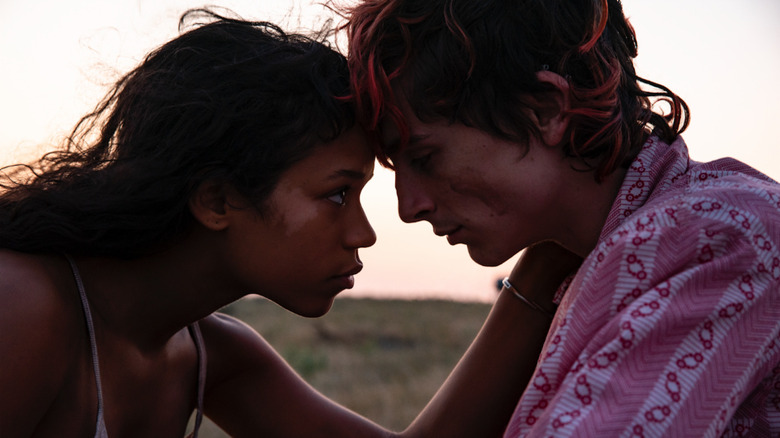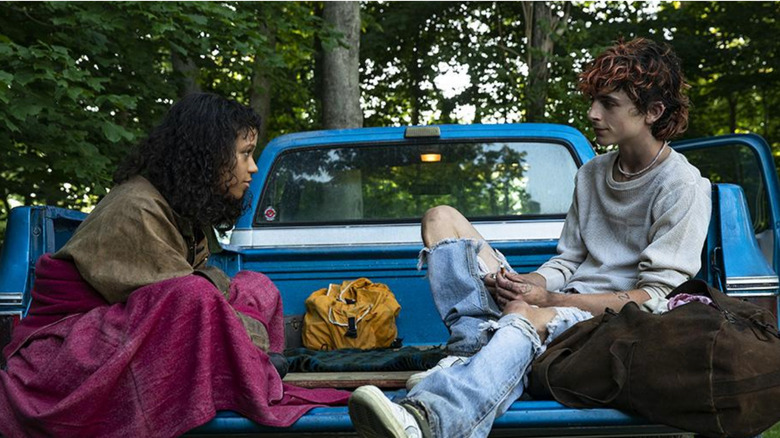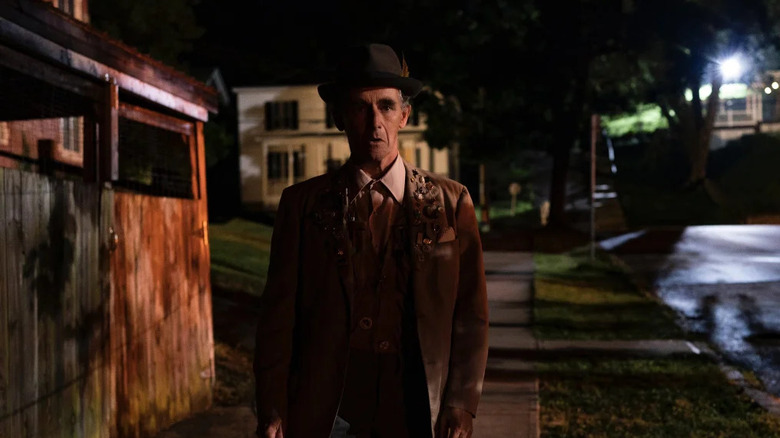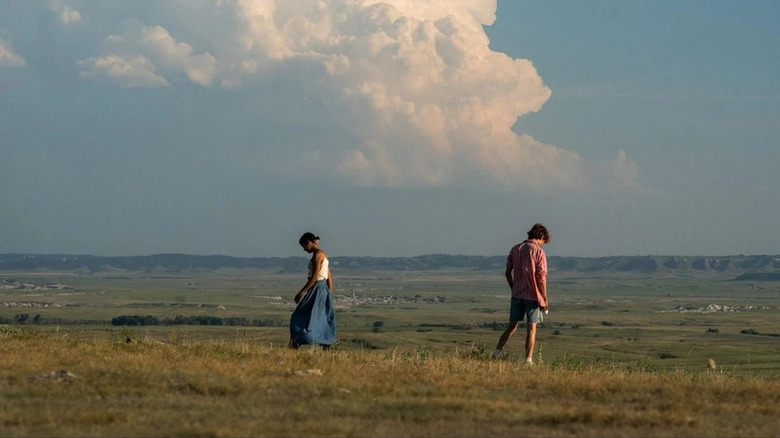Bones And All Director Luca Guadagnino Thinks We Are All Outsiders [Exclusive Interview]
"Bones and All" is the kind of movie that settles deep down in your bones. The latest film from "Call Me by Your Name" and "Suspiria" director Luca Guadagnino, "Bones and All" adapts the novel of the same name by Camille DeAngelis and follows the story of two young cannibals who fall in love as they roam across America in the 1980s. It's a movie about young love, about life on the outskirts, about living with an insatiable hunger that can connect you with people but alienate you from society. It's the lovely, gory medium between Guadagnino's swooning romances, like the films of his "Desire" trilogy, and his grotesque horror films like "Suspiria." But how would Guadagnino himself describe it?
"I think it's a love story. It's a romance, and it's a fable," Guadagnino told me in an interview ahead of the wide release of "Bones and All," which has enjoyed acclaim on the film festival circuit since its premiere at the 79th Annual Venice International Film Festival. "It's a dark fable about two characters finding each other and trying to go through a quest for their love against all the impossibilities that they have to deal with, within and outside each other."
"Bones and All" reunites Guadagnino with his "Call Me By Your Name" star Timothée Chalamet, whom he ushered to international stardom with the young actor's quietly affecting, yearning lead performance in the 2017 film, leading to Chalamet receiving an Oscar nod. But in "Bones and All," Chalamet gives a sensual supporting turn next to Taylor Russell's star-making role as Maren, the teenager who has spent her whole life trying to repress her cannibalistic tendencies. Russell is a revelation in the role, and together with Chalamet, watching the two feels like witnessing old-fashioned movie magic.
I spoke with Guadagnino about the secret formula to actor chemistry (according to him, there is none), working with Chalamet and Michael Stuhlbarg again, and reining back some of the grossest gore of the film.
'I let life to take over'
This interview has been lightly edited for clarity and brevity.
Taylor Russell, in particular, is such a star in this movie. You have a knack for finding stars to embody the feeling of your films, whether it's Tilda Swinton in "I Am Love," Timothée Chalamet in "Call Me By Your Name," and now Taylor Russell in "Bones and All." How do you find stars that have the right essence that feels right for your film? Or if not, how do you draw it out of an actor?
I don't know. If I had the recipe, I would be a rich man. I resort very strongly to my sense of intuition. It helps a lot to see the work of these people. And if they have not made much work or no work, it's great to meet these people and to feel what they bring from within themselves.
And Taylor, I've seen her in the great movie "Waves" by Trey [Edward] Shults. She was amazing in it, and I felt that I had to talk to her after I got the script for this movie. In conversation with her on Zoom, unfortunately, because it was big Covid times, I felt that this was the perfect choice for me — that she was the perfect person to make the movie with.
Taylor and Timothée have such incredible chemistry. How do you work with actors to develop this intimate dynamic?
I think I'm a good chaperone, and I get people to be together in the same place and spend time together. I let life to take over. I knew, knowing Timothée and his curiosity and his brilliant capacity of being so human, that he was going to be kind and open to Taylor. And I quickly got to understand how Taylor is a strong woman with a beautiful heart. We spent time together. We were in Ohio. We were working and living together under the same roofs, the roof of Ohio and the Midwest. And it was beautiful to see this bonding friendship becoming something that then put on screen the great chemistry between these two characters.
Was making this movie during Covid helpful in developing the closeness for that ensemble, because you're shooting this road movie, you're shooting in very isolated areas with a group of people who saw each other so closely?
I don't want to say that Covid has been useful to anything. Honestly, no. No. But we were together, and it was great.
Okay. Well, let's talk a little bit about your work with Timothée. What is it about his persona, his acting style, his aura that so deeply appeals to you as a director?
I love Timothée because Timothée is a very curious person. He's very sophisticated in his tastes. He teaches me a lot about music, by the way, and I saw him becoming this great star and yet never, never putting that in front of his curiosity for cinema and capacity of challenging himself and experiment. He's a great accomplice and a great partner in the crime that he is making films, for me.
And would you work with him again, after working with him twice now?
Over and over.
'I think every movie I make stands for itself somehow'
You cast Michael Stuhlbarg in "Bones and All" in a very different role from his acclaimed performance in "Call Me by Your Name." This time he plays a much less refined character, who is a fellow cannibal on the road. Once again, he delivers a monologue that feels of a piece with his monologue in "Call Me by Your Name," at least in the way that it makes such an impact on our protagonist. Was this an intentional choice on your part?
Honestly, no. Once I finished the movie, I realized that somehow Jake, the character he plays in this movie, might be some sort of perverted, the twisted version of the father of "Call Me by Your Name," Sam. But I didn't — it wasn't intentional. It's a pleasure to work with Michael Stuhlbarg. He is such an incredible actor and such a generous person. And the way in which he has given everything to the movies we made together, it's so touching to me. And yeah, I really didn't think about doing a parallel to the two movies, but it was fun to see that happening.
One of the performances that I really enjoyed in "Bones and All" was Mark Rylance, who is a sort of unassuming menace that ultimately becomes both an antagonist and a reminder to Maren and Lee that they can't live the normal life that they crave. What was the direction that you gave him for his particularly chilling performance?
I think we discussed a lot about the fact that we could see this movie as the movie about someone, like his character, looking for contact and not being able to, because having been alone for so long, he has lost touch on how to be in touch with somebody. So it's a movie ... I asked him to make sure that Sully could come across as someone who was really desperately trying to find a talent that he couldn't grasp with someone he was kind of interested in because of his need of contact.
I think you've spoken before about how "Bones and All" is a thematic foil or a juxtaposition with "Call Me by Your Name," at least of sorts. You talked about Michael Stuhlbarg just having that parallel. Would you say that maybe the two of them are companion pieces in some way? Or was this just coincidence?
I don't think so. I don't think they're companion pieces. I think every movie I make stands for itself somehow. No, I wouldn't put them ... both movies deal with love and the relentless nature of being in love, but they couldn't be more different somehow.
'I think somehow, one way or another, we all are, in a moment in our lives, outsiders of something'
Your filmography spans from romance to horror, but "Bones and All" kind of sits squarely in the middle. Would you describe it as more of a horror movie or romance movie or something of its own ilk?
I think it's a love story. It's a romance, and it's a fable. It's a dark fable about two characters finding each other and trying to go through a quest for their love against all the impossibilities that they have to deal with, within and outside each other.
To you, what is the most powerful element of Camille DeAngelis's novel that you wished to convey in your film or maybe wished to bring forward in your film?
I would say the sense of Maren being lost in the quest she goes through. It was very beautiful in this novel. I hope that ... certainly [screenwriter] David [Kajganich] did an amazing job, and Taylor did an amazing job in getting that right. I hope that I've succeeded, too.
Although "Bones and All" isn't necessarily tame, you sometimes cut away from some of its goriest moments. What went into choosing which scenes went in and which scenes didn't?
We never wanted to go for the shock value, ever. We wanted to be consistent to the nature of the movie as a sort of morality tale in which you could see the struggle these characters go through in regard to their nature, and how they could overcome it or not. That's what we did.
Were there any scenes that were left on the cutting room floor that you wish might have remained?
No, no. I'm happy with the result as it is.
This, as you said, is a morality tale. It's a film about outsiders, and there's been a lot of comparisons drawn to it with the LGBTQ experience and that kind of thing. Would you make that kind of comparison yourself? Or is it something that just reaches to all outsider communities?
I think somehow, one way or another, we all are, in a moment in our lives, outsiders of something. I think that's a very universal theme. I hope people can see that.
"Bones and All" opens in theaters on November 18, 2022.



